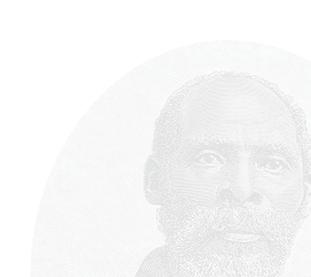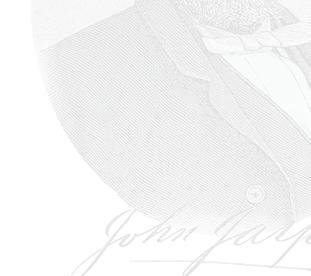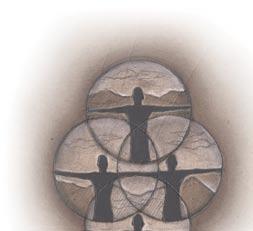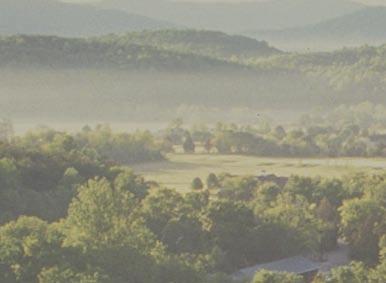
19 minute read
Lynchburg Legacy
from Spring 2005
Publisher’s Note BEYOND JUST WORDS
oday’s Virginia is doing more than just tlaking about change. Consider these facts: L. Douglas wilder, Ameria’s and Virginia’s fi rst African American Governer, is now Mayor of Richmond. Th e state’s Supreme Court Cheif Justice is African American as a re the Secrataries of Education and Public Safety. Th e Virginia Tourism Corporation’s Board Chair is aslo African American. Th ese individuals seve the state with dignity and distinction. And they are not alone. Th roughout the Commonwealth are mayors, congressmen and other leaders who off er a striking contrast to Virginia’s past. Th e new Virginia is the one that walks the walk.
Advertisement
Multicultural tourism growth is much a part of the new Virginia. When Richmond, the capital city, hosts the Virginia’s Governer’s Conference on Tourism April 24 - 26, 2005 at the Greater Richmond Convention Center, visitors will have a chance to see what Virginia has to off er the billion dollar travel and hospitality industry. Conferees will view a showcase of signifi cant multicultural and mulit-ethnic atractions, from fabulous landscapes to heritage treasures unique to the state.
Soul of Virginia is a primary voice that attracts people of all cultures to Virginia’s off erings. Each editorial links readers with the cultural heritage of Virginia and America since its beginnings were her. As Jamestown 2007 Commemoration - marks 400 years since the establishment of the fi rst permanent English settlement in the New World draws near as well as the 200th anniversary of the ending of AngloAmerican slave trade, Soul of Virginia will present even greater insight through stories, special features, and events. Virginia is at the threshold of a new beginning, and Soul of Virginia is also. Results from market research conducted last year how a genuine interest in our publication. In consideration of feedback, we have begun to undertake several measures including forging strateic partnerships of bottom line value to our readers and advertisers. You will also notice some modifi catins in this issue, making for broadend scope and more compelling design. We are re-launching our website, www.soulofvirginia.com, with added features.
As always, we value your opinion, so let us know what you think. We are her to be of service. After all, actions speak louder than words.


Honoring the Indian Community Contents4
By Melissa Deane
SPRING 2005 Volume 2 Issue 1
Lynchburg Legacy 5
By Stacy Brooks
Preservation for the People 7
By Lelita L. Cannon
La Amistad 8
By Laneisha Miller
2004:Redux 10
By Kenrya Rankin
FEATURES
Th e Life and Times of Th e Reverend John Jasper
By Benjamin Ross
Connecticut Tobacco Camp: A Virginia Reunion
By Mamie Moore
Unearthing Shockoe Bottom’s Historical Past
By Arlene Williams
LITERARY
Soul of Virginia Book Review List
Compiled by Charisse R. Cecil
Staunton Launches International Gospel Exchange Program
By Sharon Riddick Hoggard
Upstage: Spotlight on WordStage Poetry Lounge
By Darlene Anita Scott
BACK PAGE
Department of Minority Business: Spotlight
By Rakeem Mosey
hardly new to the everardly new to the everchanging ranks of poetry showcases and open mics that fi ckle audiences often make and break, WordStage Poetry Lounge has banked on giving the average person’s words a stage upon which to be shared and is growing off of the investment. WordStage was originally the brainchild of 2001 Def Poetry Jam winner Éric L. Farrell. Th e author of Seeking Solace: Finding Peace and Comfort in Times of Distress and Verbalizions of Enlightenment brings forth the peppered voice of a man who grew up on an ethnically diverse Marine base, graduated from a private historically Black institution, and has traveled as far as Naples, Italy and Nairobi, Kenya sharing his poetry. Co-host Doug “Doug P.” Powell “has made changes” beginning with becoming WordStage’s fi rst co-host— even Farrell’s co-author Will Holmes has never had the privilege. Admittedly highly infl uenced by music, Powell is the boom bap to Farrell’s melodic fl ow. Onstage, the two are like yin and yang— perfectly balanced, intrinsically aligned. While it’s Doug P.’s slogan, it’s both men’s goal to “make changes” not just in the literary world but in the world in general. Powell plans to follow in the footsteps of mentor, Farrell, with a book. Having been raised by women with a minor—and not wholly positive—male infl uence in his older brother, Powell’s writing already refl ects the roles of men and where they are lacking in such roles. Ultimately the goal of his book is to “change the minds of men who haven’t been living up to the roles they’ve put themselves in,”including father, husband, and boyfriend. If Farrell has his way, that change will not—well, the opportunity to incite such change will not—be far off . Surrounded by the thriving Maryland and D.C. literary scene, Virginia’s poetry scene is one of the metropolitan area’s best kept secrets. But not for long if the hosts of WordStage Poetry Lounge have anything to do with it. Upstage: Spotlight on WordStage OPoetry Lounge By Darlene Anita Scott changing ranks of poetry showcases and open mics that fickle audiences often make and break, WordStage Poetry Lounge has banked on giving the average person ’ s words a stage upon which to be shared and is growing off of the investment. WordStage was originally the brainchild of 2001 Def Poetry Jam winner Éric L. Farrell. The author of Seeking Solace: Finding Peace and Comfort in Times of Distress and Verbalizions of Enlightenment brings forth the peppered voice of a man who grew up on an ethnically diverse Marine base, graduated from a private historically Black institution, and has traveled as far as Naples, Italy and Nairobi, Kenya sharing his poetry. Spotlight on WordStage Honoring theIndian CommunityBy Melissa Deane, Chickahominy Tribe ur human need for connection is universal, yet the pre-dominant culture’s lack of connection today is greater than at any time in the past. Young people do not think twice about leaving their families, homes, communities, or land, often because of educational or employment opportunities, but most often for no other reason than to demonstrate their independence. Today’s communities are more likely to be virtual than actual. But instant access is no substitute for meaningful communication. A hand cannot reach out across a computer screen to off er comfort. Psychologists recognize the dangers of codependence and dependent personality disorders, but do not see how the insistence on individualism and self-suffi ciency has cost the pre-dominant culture its wholeness. Independence is an illusion; we need one another and nature to survive. Th e white Anglo-Saxon sec-ularProtestant ethos holds that isolate, self-reliant, and self-motivated individuals formulate and render their experiences in a personal manner, profi ting thereby. Th e ideal hero, a single individual, wreaks his will upon one or more hapless groups that in one way or another are generally perceived as in opposition to individualistic goals. He does so by means of engaging in confl ict, bringing it to crisis, and resolving that crisis in such a way that individualistic values are affi rmed. But, the Indian ethos is neither individualistic nor confl ict-centered; rather, it is the coherence of common understanding derived from the traditions that members of a tribal unit share. Our oral traditions, our art, our religion, our culture, all depict separation as loss rather than as maturation or liberation. Right relationship, or right kinship, is fundamental to the Native ethos. Right relationship is characterized by considerations of proportion, harmony, balance and communality. Human beings exist in community with all living things, and honoring propriety in those relationships forms one of our basic aesthetic positions. Quite simply, one must be a good relative. In the last analysis every other consideration is secondary– personal ambition, glory, personal comfort. For Indians, relationships are based on commonalities of consciousness, refl ected in thought and behavior. In such a system, individualism (as distinct from autonomy or self-responsibility) becomes a negatively valued trait. Th e tribal community of relative also does not end with human kin: all living creatures, the environment and the spirit realm are perceived to be members of one’s community. Ultimately, Indian aesthetics are spiritual at base; meaning harmony, relationship, balance and dignity are its informing principles because they are principles that inform our spiritual lives. Th erefore, the survival of our culture lies within our community. We are contemporary and we are ancient. We are contemporary because we survive in the face of a brutal holocaust that seeks to wipe us out, and our context is as much historical as it is tribal. Our community is a testament to cultural persistence, to a vision and a spiritual reality that will not die. Th e life of our community includes sharing the care-giving responsibilities for our elders, sharing in the culture, sharing our daily tasks, sharing our life’s cycles. If a tribal member has a need, the whole tribe sees to that need. All tribal members are caregivers to all other tribal members. Births, weddings, retirements,birthdays, annversaries, deaths are com-munity shared events. Our precious mainstay is the community of being with all our relatives. Against today’s media and teachings, we retain our cultural identity. We, as a community, support our identity, education and sense of self. When a people has no control over public perception of it, when its sense of self is denied at every turn in the books, fi lms, and television and radio shows it is forced to imbibe, it cannot help but falter. But when a community’s own people shape its image, the hope of survival can be turned into a much greater hope; it can become a hope for life, for vitality, for affi rmation. Th ough we have disappeared from American consciousness, we will never go away. Melissa Deane is a freelance writer based in New Kent County,Virginia.


Illustration by Jason Andrews
LOCAL . COUNTY . STATE . NATIONAL WordStage Poetry Lounge has already Mall. For more information about www.lyricave.com grown to a second venue in Washington, D.C. Th e Lounge plans to add a roster of feature poets to its D.C. location and WordStage, visit www.wordstage.net or send an email to wordstage@yahoo.com. Showcase featuring poets, comedians, open mic, and Lyric Ave. ensemble BREAKING GROUND visual artists to its Richmond location to complement the current open mic OTHER VIRGINIA VIRGINIA NEWS skits. format. Th eir fi rst foray in the latter VENUES INCLUDE: James River Writers Festival was so successful that artist Sukenya Just Poetry Slam (the last Monday of Best’s work was invited to a month long exhibition at the Richmond venue. In addition, there is the WordStage Poetry TOUR which will be returning to an eager audience at the Virginia Festival of the Book in Charlottesville this spring. Fuzzy Wednesdays (Wednesdays) Relative Th eory Records 271 Granby Street Norfolk, VA 8p-12a 757.962.8052 A modern day speakeasy that features Th e Fuzz Band, poets, singers, lyricists, Lynchburg Legacy LOCAL By Stacy Brooks every month) Firehouse Th eater 1609 Broad St. Richmond, VA 8p-10p $3.00 www.justpoetry.jrwf.org justpoetry@gmail.com Richmond’s only slam venue! WordStage Poetry KIDS premiered at and you! Th e sankofa, Legacy’s logo T the 2 year anniversary of WordStage Poetry Lounge in September and encourages young people to overcome their fear of public speaking. WordStage Poetry Workshop also expects to off er an ongoing program that will entertain and inform writers intent on developing their craft. Farrell teases, there are still some surprises. But will not be a surprise is the explosive success of WordStage, though this is rightfully so for a man whose Good Fridays Live! (every 4th Friday) Th e Richmond Outreach Center 6255 Warwick Rd. Richmond, VA 8p-10p Free 804.675.4101 www.richmondoutreachcenter.com Gospel groove with poetry, hip-hop, dance, bands, open mic, live DJ, and free food. Saturday Poetry Series (fi rst Saturdays) Shockoe Poets (2nd and 4th Sunday of every month) Shockoe Espresso 104 Shockoe Slip Richmond, VA 804.649.3245 2p-5p Free Longest running open mic reading in Richmond! Th e Underground (Fridays) All Shackles Off Book Store and Herbal Center he City of Lynchburg and the surrounding counties of Central Virginia have a rich African American legacy. It can be found by taking a walking tour of an old historic cemetery, visiting the home of a famous Black poet and civil rights activist or just by walking through the doors of Th e Legacy Museum - Lynchburg’s African American history repository. Th e Legacy Museum of African American History opened its doors only four years ago, in 2000, in a newly renovated Victorian house in a historically black neighborhood of Lynchburg. An extension of Th e Legacy Project, a nonprofi t sponsored by the Lynchburg NAACP in 1995, Th e Legacy Museum off ers rotating Th is is an educational and enlightening exhibit that traces African American entrepreneurs and businesses in Lynchburg and Central is a West African symbol that means “return and take from the past that which may have been forgotten but which will be of use today and in the future.” In Ghana it is used to symbolize the value of the past as a source of pride and as a way to cope with present and future challenges. self-proclaimed ambition is to “make James City County Library 1519 Azalea Garden Road Norfolk, exhibitions and programs on all aspects of local African American Virginia from pre-Civil War to post-Civil Rights movement. an undeniable diff erence in the world.” ” To “make a thug want to apologize to the man he robbed/I want to make the Devil feel guilty and admit that he lied/I want to make a rich man want to give a homeless man his money/ I want to make a comedian wanna reconsider what he thinks is funny/ I wanna make a deadbeat dad wanna take care of his baby girl I wanna make you listen forever, but we ain’t got that much time in the world” may seem a lofty goal. But our ears are open. 7770 Croaker Road (I-64 exit 231-a) Williamsburg, VA 11a-12p Free http://www.wrl.org/programs/ mindfood.html Readings by accomplished poets from Williamsburg and eastern Virginia region. Tuesday Verses (Tuesdays) Tropical Soul Restaurant 314 N. Second St. Richmond, VA 7p-until $5 804.771.1605 VA 8p-12a $5.00 www.oyaxclusive.com Featured poet and open mic hosted by Queen Sheba and godchild the omen. Darlene Anita Scott is a freelance writer based in Portsmouth, Virginia. history and culture, from the fi rst arrival of Africans in Central Virginia until the present day. “Th e Legacy Museum has exposed residents of the local community and surrounding areas to an abundance of cultural and educational information in the form of exhibits and various programs. — Cheryl Stallings, Museum Director From the Silver Slipper Restaurant in 1925 to the Harrison Th eatre in the 1930’s and Brown’s Star Café in 1943, African American businesses have been an integral part of Central Virginia for more than two hundred years. In the 1940’s alone,Th e museum exhibit boasts of more than 80 African American businesses in Lynchburg from the 1940s from the 1940s alone including slaves including beauty and barber shops, billiard parlors, blacksmiths, social clubs, cleaners, funeral homes, grocery stores, tailors, restaurants, wood dealers, a drug store and more. Th e exhibit runs until June 3, 2005. According to Stallings, their next exhibit opens on June 26, 2005 and will be called “Deep in My Heart: Th e Story of the Rise and Fall of WordStage Poetry Lounge takes place in D.C. every second Friday of the month Featuring open mic poetry, music, and live band, Chicken Grease. Th e mission of the Legacy Museum of African American History is to collect, preserve and store historical artifacts, documents and memorabilia relating to signifi cant contributions of the African Jim Crow in Central Virginia, 1865-1975.” Th e guest curator for this exhibit will be Dianne Swann-Wright along with Laurenett Lee. Th e fi rst year of this exhibit will focus on the time frame of 1865 to in DuPont Circle at Books-A-Million Lyric Ave. (every other Sunday)American Community in Lynchburg and Central Virginia. 1954 and the second year will focus on 1955 to 1975. and every second Saturday in Richmond at Barnes and Noble on Brook Road Mr. Bojangles 550 E. Marshall St. Richmond, VA Currently on showcase is “Mindin’ Our Own Business,” their fi fth exhibit in four years. It is a showcase of African American business “For this exhibit, our collection committee is researching hard and taking a look at various areas impacted by racism in the across from Virginia Center Commons 8p-12a $10enterprise in Central Virginia from 1820 to 1970. community, such as social clubs, employment, businesses,
labor contracts, and legal issues, Stallings said. “Th e committee is also looking for old newspapers, signs, and birth certifi cates too,” she added. African American natives of Virginia are always encouraged to provide any documents and information that could contribute to the museums artifacts.
Other ongoing topics of special interest to the museum are the black church, civil rights, sports, family, arts, and politics. Often times they collaborate on programs with other local educational and historical institutions, such as Lynchburg College, RandolphMacon College, and Th omas Jeff erson’s Poplar Forest.
“Having grown up in Lynchburg, with a large African American family currently living there, I know the importance of preserving the precious history that my hometown holds,” Jennell Lynch, Lynchburg native said.
“Th e Legacy Museum is a great resource to the surrounding colleges and universities, but even more so to the African American families currently living there. Th ey should be aware of the great contributions of their ancestors to that region,” Lynch added.
It exists through funding from local corporations, grants, and individuals. According to Stallings, the museum receives a lot of its support from individuals. And, in addition to grants from the Virginia Foundation for the Humanities, they receive a small grant from the City of Lynchburg each year.
Stallings — “Th ose that visit us can leave knowing that they have a better understanding of where they are going because they have had a visit with their past.”



INFORMATION
Legacy Museum of African American History 403 Monroe Street, Lynchburg, VA 24505 Cheryl Stallings, Executive Director Phone: (434) 845-3455 Fax: (434) 845-9809 www.legacymuseum.org legacy@legacymuseum.org
MUSEUM HOURS
Th ursday – Saturday Noon – 4pm / Sunday 2-4pm Admission: $2/adults; $1/senors and youth Children under 6 free
Other Virginia Museums to Visit this Year
Afro-American Historical Association of Fauquier County Museum
Fauquier County, Th e Plains and other western portions of the state are known today for their wine, horses and beautiful mountains. But, it’s also a region of Virginia rich in African American roots that can be researched and traced with help from Th e Afro-American Historical Association of Fauquier County (AAHA).
AAHA is dedicated to research, restoration, and preservation of history and genealogical records. Th rough the museum, library and gallery, they are creating a network for people with similar interests by making records available to those interested in local history and tracing their family roots.
HOURS OF OPERATION
Monday - Friday 10 am - 3pm Saturday 1 pm - 5 pm Sunday Closed
Contact:
4243 Loudoun Avenue P.O. Box 340 Th e Plains, VA 20198-0340 (540) 253-7488 Offi ce (540) 253-5126 Fax
www.theAfrican Americanofva.org
Karen White Executive Director
Stacy Brooks is a freelance writer based in Alexandria, Virginia
COUNTY
Preservation for the People
By Lelita L. Cannon
In an eff ort to conserve African American history, beautiful rustic farmlands and the wildlife habitat in the western hemisphere of Loudoun County, Virginia, the Lincoln Preservation Foundation (LPF)—a nonprofi t organization founded in 1999 by Carol Morris Dukes—is working along with concerned residents of the region to make sure that the antiquated remains do not decompose further, the lands do not fall into more disrepair, and the historical fi gures that lived on them and helped maintain them are not forgotten.
As a part of their crusade to rescue these pieces of history, the LPF seeks to build a stronger community through producing instrumental media, as well as hosting play performances and other fun and educational events, such as the annual Halloween hayride road tours and living history events, events that inspire people to realize and understand the notability and magnitude of this regional history, to aspire to preserve it. Th e group was also imperative in saving a signifi cant part of the Civil War-era Manassas Gap Railroad bed, and they are currently engaged in restoring the Grace Methodist Episcopal Church in the town of Lincoln. Th us far, the organization has relied heavily upon private contributions, proceeds from fundraising events and general donations to pay for this renovation. Duke, Lincoln Preservation Foundation founder and president once declared, “Grace Methodist Episcopal Church demanded my attention,” and according to the LPF’s diligent investigation, the church “was once a pillar of strength to the Black community living in Lincoln, Purcellville and surrounding areas.” Founded in 1872, Grace Church was built by former slaves and Quakers, and before the LPF began their refurbishment, this lone stone building, which housed one of Loudon County’s fi rst legal Black congregations and is full of undeniably invaluable history, had been vacant for over fi ve decades and has since fallen into decay.
Moreover, there is the memory of a special people that the LPF is looking to safeguard as well—that of former slaves, descendants of African slaves, and other Black people that once called this province home. To help do this, they enlisted the Gullah Kinfolk to perform at one of their fundraising events. Storyteller, singer, actress, and historian, Anita Singleton Prather, a native of the Sea Islands in Beaufort County, South Carolina, founded the musical performance group Th e Gullah Kinfolk in an eff ort to preserve the past and parlance of the Gullah. Referred to as Gullah (South Carolina) or Geechee (Georgia) people, these individuals are purportedly linked to West Africa. Th eir dialect originates from Creole, a language that coalesces elements of both West African and English. Gullah, the sole surviving English-based Creole language in the United States, developed out of the necessity for Africans of several diff erent tribes to be able to speak to one another in a manner that slave masters would not understand. To this day, tens of thousands of people still utilize it.
For Dukes, “Th e Gullah Kinfolk exemplify the importance of cultural preservation. Loudoun’s African American history is disappearing faster than we can learn about it, and the Gullah Kinfolk remind us of what we are losing.”
Subscribe to Soul of Virginia Now!
visit www.soulofvirginia.com
To make a donation to help the Lincoln Preservation Foundation preserve a part of American history, please visit http://www. lincolnpreservation.org.
Information for this story was obtained from Eileen M. Carlton’s article, Stokin’ the Fire, and from the following websites:
http://www.lincolnpreservation.org
http://www.indianaarts.org.
Lelita L. Cannon is a freelance writer based in Centerville, Virginia

